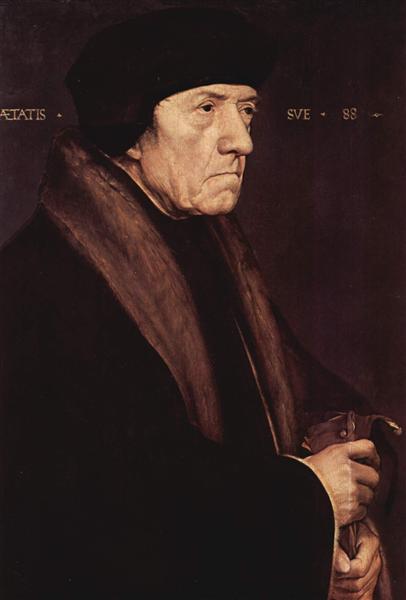Description
In Hans Holbein's workshop, the young man, the human figure receives life through a meticulous line control and a color palette that evokes both reality and a deep symbolic load. His work "Portrait of Dr. John Chambers", conducted in 1543, is erected as a magnificent example of the mastery that the Swiss artist developed in the portrait, a genre that explored with psychological acuity and detail attention that distinguishes it in The Nordic Renaissance.
In this portrait, Dr. John Chambers is represented standing, a gesture that communicates both trust and authority. Holbein uses a vertical composition that focuses the viewer's gaze on the protagonist, adorned with a rich black dress and a back -style that suggests both the fashion of the time and the social status of the portrayed. This use of black, in combination with the texture of the carefully represented fabric, highlights the doctor's figure, providing an air of dignity. The simplicity of the background, which is blurred in a gray -tone, emphasizes the focus on chambers and minimizes any distraction of the context, a resource that reflects the pragmatism of the Renaissance painting.
The face of Dr. Chambers, immortalized by Holbein, offers a series of subtleties that allow the observer to interpret his character. The serene but determined expression, together with the penetrating eyes that seem to direct the viewer's gaze, give life to a figure that transcends time, providing it with a psychological depth. Each wrinkle and each expression line reveal not only the age of Chambers, but also their wisdom and experience, key features for a man in his position.
Holbein also makes color intelligently. The palette, dominated by dark and turned off, is subtly illuminated with the inclusion of details in the costumes, such as the bad decorative necklace that adorns its neck. These details not only add visual wealth, but they also fulfill a symbolic function: the warmest gold and the tones suggest status and knowledge, ligating to Dr. Chambers with the humanist ideal of the scholar.
Another interesting aspect of this work is the historical context in which it was created. Hans Holbein, known for his portraits of notable figures from the Court of Enrique VIII, distinguished himself by his ability to capture the essence and individual character. "Portrait of Dr. John Chambers" is not only a testimony of Holbein's technical skills, but also reflects the importance of medicine and knowledge in 16th -century England, a time that saw the flourishing connection between science and Humanism.
The work is inserted into the broader corpus of Renaissance portraits that celebrate both individuality and the ideal of reason and education. Compared to other works by Holbein, such as his famous portrait of Enrique VIII, this piece highlights his ability to adapt his approach to different types of subjects, showing a diverse understanding of humanity that manifests itself both in the nobility and in scholars, underlining the Universality of the art of portrait in its time.
"Portrait of Dr. John Chambers" is ultimately a testimony of Holbein's ability to combine master technique with a deep sensitivity towards human character. Through his strokes and his ability to capture light and expression, the artist offers the spectator not only a representation of an individual, but also a reflection of a time when science, aesthetics and humanity intertwined in The flowering of Renaissance thought.
KUADROS ©, a famous paint on your wall.
Hand-made oil painting reproductions, with the quality of professional artists and the distinctive seal of KUADROS ©.
Reproduction service paintings With a guarantee of satisfaction. If you are not completely satisfied with the replica of your painting, we refund your money 100%.

